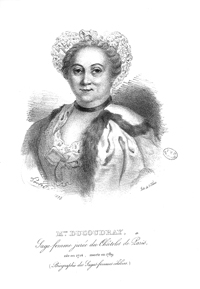Angélique du Coudray
French midwife and educator
Angélique Marguerite Le Boursier du Coudray (1712–1794) was a pioneering French midwife and educator who played a significant role in improving obstetric care in 18th-century France. She is best known for her innovative teaching methods and the creation of a life-sized obstetrical mannequin, known as "the machine," which she used to train midwives across the country.
Early Life[edit]
Angélique du Coudray was born in 1712 in Clermont-Ferrand, France. Little is known about her early life, but she came from a family with a medical background, which likely influenced her career choice. She trained as a midwife in Paris, where she gained a reputation for her skills and expertise in obstetrics.
Career[edit]
Development of the Obstetrical Mannequin[edit]

In the mid-18th century, France faced a high rate of maternal and infant mortality, partly due to the lack of trained midwives. Recognizing this issue, du Coudray developed a life-sized obstetrical mannequin, which she called "the machine." This innovative teaching tool allowed her to demonstrate and teach complex birthing techniques to midwives in a practical and hands-on manner.
The mannequin was made of fabric and leather, with internal structures that mimicked the female reproductive system. It included a fetal model that could be manipulated to simulate various birthing scenarios, allowing students to practice and refine their skills.
Royal Commission and National Training Program[edit]
In 1759, King Louis XV commissioned du Coudray to travel throughout France to train midwives in rural areas. This initiative was part of a broader effort to reduce infant mortality and improve public health. Over the next two decades, du Coudray traveled extensively, conducting training sessions in towns and villages across the country.
Her training program was highly successful, and she is estimated to have trained thousands of midwives. Her work significantly improved the quality of obstetric care in France and contributed to a decline in maternal and infant mortality rates.
Publications[edit]
In 1759, du Coudray published "Abrégé de l'art des accouchements" ("Abridgment of the Art of Delivery"), a comprehensive manual on midwifery. The book was widely used as a textbook for midwives and was praised for its clear and practical instructions.
Legacy[edit]

Angélique du Coudray's contributions to midwifery and obstetric education had a lasting impact on the field. Her innovative teaching methods and dedication to improving maternal and infant health set new standards for midwifery practice. Her work paved the way for future advancements in obstetric care and education.
Du Coudray's legacy is remembered not only for her technical innovations but also for her commitment to public health and her role in empowering women through education. She remains a celebrated figure in the history of medicine and midwifery.
Related Pages[edit]
Ad. Transform your life with W8MD's Budget GLP-1 injections from $75


W8MD offers a medical weight loss program to lose weight in Philadelphia. Our physician-supervised medical weight loss provides:
- Weight loss injections in NYC (generic and brand names):
- Zepbound / Mounjaro, Wegovy / Ozempic, Saxenda
- Most insurances accepted or discounted self-pay rates. We will obtain insurance prior authorizations if needed.
- Generic GLP1 weight loss injections from $75 for the starting dose.
- Also offer prescription weight loss medications including Phentermine, Qsymia, Diethylpropion, Contrave etc.
NYC weight loss doctor appointmentsNYC weight loss doctor appointments
Start your NYC weight loss journey today at our NYC medical weight loss and Philadelphia medical weight loss clinics.
- Call 718-946-5500 to lose weight in NYC or for medical weight loss in Philadelphia 215-676-2334.
- Tags:NYC medical weight loss, Philadelphia lose weight Zepbound NYC, Budget GLP1 weight loss injections, Wegovy Philadelphia, Wegovy NYC, Philadelphia medical weight loss, Brookly weight loss and Wegovy NYC
|
WikiMD's Wellness Encyclopedia |
| Let Food Be Thy Medicine Medicine Thy Food - Hippocrates |
Medical Disclaimer: WikiMD is not a substitute for professional medical advice. The information on WikiMD is provided as an information resource only, may be incorrect, outdated or misleading, and is not to be used or relied on for any diagnostic or treatment purposes. Please consult your health care provider before making any healthcare decisions or for guidance about a specific medical condition. WikiMD expressly disclaims responsibility, and shall have no liability, for any damages, loss, injury, or liability whatsoever suffered as a result of your reliance on the information contained in this site. By visiting this site you agree to the foregoing terms and conditions, which may from time to time be changed or supplemented by WikiMD. If you do not agree to the foregoing terms and conditions, you should not enter or use this site. See full disclaimer.
Credits:Most images are courtesy of Wikimedia commons, and templates, categories Wikipedia, licensed under CC BY SA or similar.
Translate this page: - East Asian
中文,
日本,
한국어,
South Asian
हिन्दी,
தமிழ்,
తెలుగు,
Urdu,
ಕನ್ನಡ,
Southeast Asian
Indonesian,
Vietnamese,
Thai,
မြန်မာဘာသာ,
বাংলা
European
español,
Deutsch,
français,
Greek,
português do Brasil,
polski,
română,
русский,
Nederlands,
norsk,
svenska,
suomi,
Italian
Middle Eastern & African
عربى,
Turkish,
Persian,
Hebrew,
Afrikaans,
isiZulu,
Kiswahili,
Other
Bulgarian,
Hungarian,
Czech,
Swedish,
മലയാളം,
मराठी,
ਪੰਜਾਬੀ,
ગુજરાતી,
Portuguese,
Ukrainian